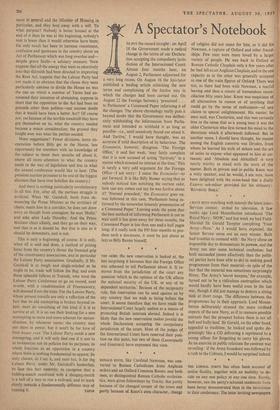A Spectator's Notebook
TO Ptrr the record straight : on April 18 the Government made a radical change in the terms of our Declara- tion accepting the compulsory juris- diction of the International Court. Almost four months later, on August 2, Parliament adjourned for a very long recess. On August 16 the Spectator published a leading article criticising the new terms and complaining of the furtive way in which the changes had been carried out. On August 22 the Foreign Secretary 'presented . . . to Parliament' a Command Paper informing it of the changes. The above chronology really puts it beyond doubt that the Government was deliber- ately withholding the information from Parlia- ment and intended to withhold it as long as possible—i.e., until somebody found out about it. And 'furtive,' I would have thought, was an accurate if mild description of its behaviour. The Economist, however, disagrees. 'The Foreign Office,' it said last week, 'may fairly complain that it is now accused of acting "furtively" in a matter which aroused no interest at the time.' This is surely a very odd argument for the Foreign Office—I am sorry: I mean the Economist—to put forward. It is like Billy Bunter saying that as nobody noticed him snitching the currant cake, how can any rotten cad say he was furtive about it? 'Normal precedent,' the Economist goes on, was followed in this case, 'Parliament being in- formed by the somewhat leisurely presentation of a Command Paper.' Leaving aside the point that the best method of informing Parliament is not to wait until it has gone away for three months, the Command Paper is less than one and a half pages long; if it really took the FO four months to pro- duce such a document, it must be just about as lazy as Billy Bunter himself.






























 Previous page
Previous page